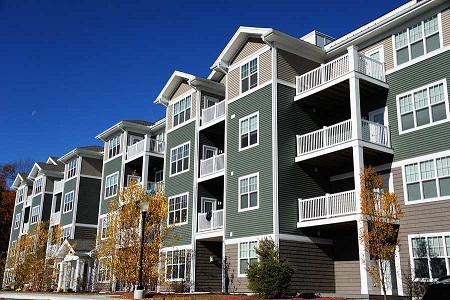
Condos are rarely the first come to mind when you think about flipping homes. However, there is no reason to avoid them as a real estate investment arbitrarily. The inventory in the DC area is tight, so if a good deal comes along, there is no reason to pass on it just because it’s a condo. Like with everything else in life there are pros and cons of investing in condos. What gets less experienced rehabbers in trouble is that they fail to recognize the unique differences between investing in single family homes and investing in condos.
Condo Renovation Scope
Pros: To be honest, the best thing about investing in condos is the limited scope of the renovation. Your crew can literally breeze in and out of there in a month or less. There are less unpleasant surprises such as cracked foundations, mold and leaking roofs. Before you buy, make sure to check in with the condo association to see what exactly they are responsible for. For example, if you are buying a townhouse condo, is the exterior maintenance paid by the association or do you need to budget for it?
Cons: Rehabbing condos offer little room for differentiation. You will not be able to count on the quality of your renovation to getter a better sales price. Save your creativity for a single-family home and stick with the same upgrades as your neighbors.
Condo Associations
Pros: Depending on the association, your condo fee could cover many or just a few parts of standard property maintenance. They might pay for landscaping (or not), exterior maintenance (or not) and even your water usage (or not). Never make assumptions though and read the by-laws carefully.
Cons: Where do I begin? Not to sound cliché, the devil is in the condo association details. A deal that sounded amazing on the surface might look like a mousetrap once you read the association documents. The first thing to consider is the condo dues. It’s not unusual for even a small condo in the DC area to have a monthly association fee of $250 or higher. A mortgage payment on a condo like that might look like a great deal, but add the association fee, and the numbers might look very different.
Another factor to consider when investing in condos is whether the condo association is FHA-approved or not. Condos often attract first-time homebuyers with a limited down payment. If the condo association is not FHA-approved, you will be eliminating a significant portion of your potential buyers.
Last, but not least, you should investigate the general health of the condo association. The health of the association is generally measured by the delinquency rates on its dues. There are two reasons to be concerned about it. If you are thinking about flipping a condo, you need to know whether there is anything that might spook your buyer away. For example, if the association has a high delinquency rate, many lenders might decline them for financing. If you are thinking about keeping a condo as a rental, you need to be concerned with both potential increases in the condo fees and the association’s ability to maintain the exterior premises down the line.
Condo Profit Potential
Your condo profit potential depends on the exit strategy you choose. It’s the good ole’ flip vs hold decision. My personal real estate investment philosophy is to book profits as soon as possible. If you can make a chunk of money you will be happy with it by fixing and selling, then do it this way. None of my home runs were condos, but many made decent profits, especially for the limited work they’ve required.
If you are thinking about keeping a condo in your real estate portfolio, concentrate on cash flow rather than appreciation. Condos even in the most stable areas like Montgomery County Maryland have a lower rate of appreciation than single-family homes. Make sure that you can rent the unit for enough money to cover your expenses and vacancy rates. Your expenses should include your mortgage payment, property taxes, and your condo fees.
Regardless of time horizon, investing in condos in the DC area will not make you wealthy overnight. However, if you know how to analyze their potential and control your costs, they can slowly, but surely move you closer towards your financial goals.
 New Funding Resources
New Funding Resources 





Leave a Reply